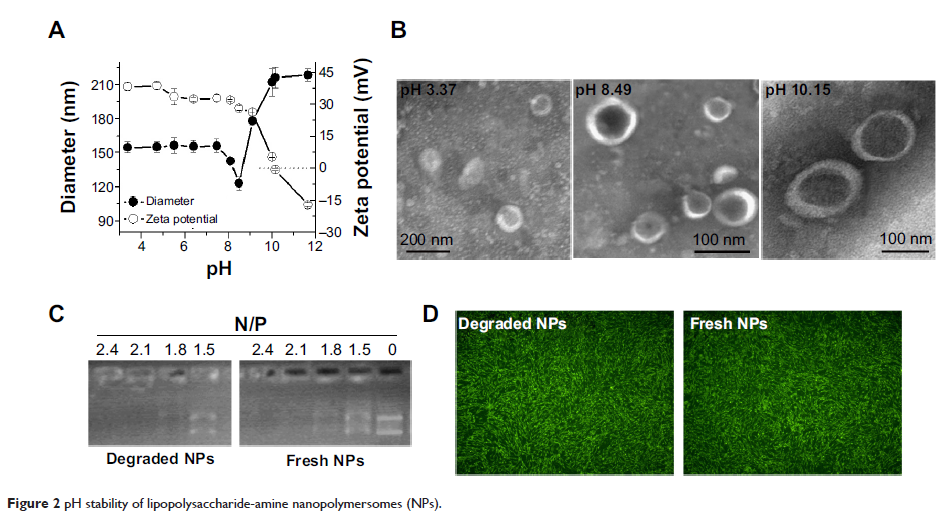108605
论文已发表
注册即可获取德孚的最新动态
IF 收录期刊
- 3.4 Breast Cancer (Dove Med Press)
- 3.2 Clin Epidemiol
- 2.6 Cancer Manag Res
- 2.9 Infect Drug Resist
- 3.7 Clin Interv Aging
- 5.1 Drug Des Dev Ther
- 3.1 Int J Chronic Obstr
- 6.6 Int J Nanomed
- 2.6 Int J Women's Health
- 2.9 Neuropsych Dis Treat
- 2.8 OncoTargets Ther
- 2.0 Patient Prefer Adher
- 2.2 Ther Clin Risk Manag
- 2.5 J Pain Res
- 3.0 Diabet Metab Synd Ob
- 3.2 Psychol Res Behav Ma
- 3.4 Nat Sci Sleep
- 1.8 Pharmgenomics Pers Med
- 2.0 Risk Manag Healthc Policy
- 4.1 J Inflamm Res
- 2.0 Int J Gen Med
- 3.4 J Hepatocell Carcinoma
- 3.0 J Asthma Allergy
- 2.2 Clin Cosmet Investig Dermatol
- 2.4 J Multidiscip Healthc

已发表论文
空或载基因的脂多糖胺纳米囊泡的稳定性和毒性
Authors Wang QM, Chen Y, Wang LC, Zhang XC, Huang HZ, Teng W
Published Date January 2015 Volume 2015:10 Pages 597—608
DOI http://dx.doi.org/10.2147/IJN.S74156
Received 15 October 2014, Accepted 1 December 2014, Published 13 January 2015
Abstract: Successful in vivo gene delivery mediated by nonviral vectors requires
efficient extracellular and intracellular gene delivery, but few studies have
given attention to the former. That is why numerous gene delivery systems have
succeeded in vitro, while the expected clinical success has not come about. To
realize efficient extracellular gene delivery, the stability of vectors and/or
their complexes with genes in body fluids is first required, which prevents
loaded genes from premature unloading and degradation. Furthermore, the storage
stability of vectors under common conditions is important for their widespread
applications. Lipopolysaccharide-amine nanopolymersomes (NPs), a gene vector
developed by our group recently, have higher than 95% in vitro transfection
efficiency in mesenchymal stem cells when delivering pEGFP , and induce significant
angiogenesis in zebrafish when delivering plasmid encoding vascular endothelial
growth factor deoxyribonucleic acid (pVEGF ). To reveal
their extracellular delivery ability and storage stability, in this study their
stability in various simulant physiological environments and storage conditions
was systematically studied by monitoring their changes in disassembly, size,
zeta potential, and transfection efficiency. Additionally, damage to the
mitochondria of mesenchymal stem cells was evaluated. Results show that NPs and
plasmid deoxyribonucleic acid (pDNA)-loaded NPs (pNPs) have acceptable
stability against dilution, anions, salts, pH, enzyme, and serum, presumably
assuring their efficient extracellular delivery in vivo. Moreover, both the
lyophilized NPs at room temperature and NP/pNP solution at 4°C have high
storage stability, and pNPs show low damage to the mitochondria. The acceptable
stability of NPs combined with compatibility and efficient gene transfection
highlight their huge potential in the clinic as a gene delivery vector.
Keywords: nanopolymersomes, extracellular delivery stability, storage stability, toxicity, polyethyleneimine, alginate, cholesterol, mesenchymal stem cells
Keywords: nanopolymersomes, extracellular delivery stability, storage stability, toxicity, polyethyleneimine, alginate, cholesterol, mesenchymal stem cells
